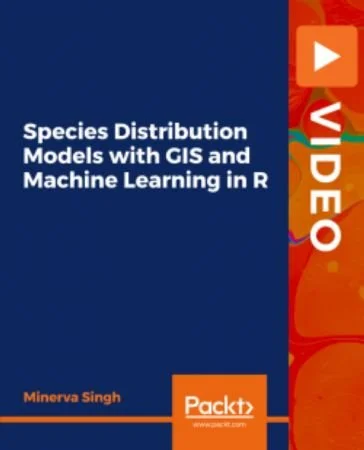Species Distribution Models with GIS and Machine Learning in R
Implement and interpret common machine learning techniques to build habitat suitability maps for birds in Peninsular Malaysia

Key Features
Learn hands-on applications of the most important R concepts with limited mathematical jargon
Get started with time series from scratch
Explore how to use both GIS and machine learning techniques for spatial data analysis
What You Will Learn
Read data into the R environment from different sources
Become well-versed with basic spatial data concepts and data types
Analyze spatial data using R
Implement GIS and machine learning methods in spatial data analysis
Harness the power of GIS and machine learning in R for ecological modeling
Discover GIS and data analysis tasks related to SDMs including accessing species-presence data via R
Perform common GIS techniques on raster and other spatial data
About
In this course, you’ll work with real-world spatial data from Peninsular Malaysia to gain hands-on experience with mapping habitat suitability in conjunction with classical SDM models, such as MaxENT and Bioclim, and machine learning alternatives, such as random forests. The course will ensure that you are equipped to put spatial data and machine learning analysis into practice right away. You’ll have developed the skills necessary for working with ecological data and impress potential employers with your GIS and machine learning skills in R.
Throughout the course, you’ll learn how to map suitable habitats for species using R. You’ll also explore common ecological modeling techniques and species distribution modeling (SDM) using real-life data. As you advance, the course will guide you in implementing some of the common Geographic Information Systems (GIS) and spatial data analysis techniques in R and use it to access ecological data. You’ll perform common GIS and data analysis tasks related to SDMs, including accessing species-presence data, and get to grips with classical SDM techniques.
All the code and supporting files are available at https://github.com/sanjanapackt/PacktPublishing-Species-Distribution-Models-with-GIS-and-Machine-Learning-in-R
About the Author(s)
Minerva Singh
Minerva Singh is a PhD graduate from Cambridge University where she specialized in Tropical Ecology. She is also a part-time Data Scientist. As part of her research, she must carry out extensive data analysis, including spatial data analysis. For this purpose, she prefers to use a combination of freeware tools: R, QGIS, and Python. She does most of her spatial data analysis work using R and QGIS. Apart from being free, these are very powerful tools for data visualization, processing, and analysis. She also holds an MPhil degree in Geography and Environment from Oxford University. She has honed her statistical and data analysis skills through several MOOCs, including The Analytics Edge and Statistical. In addition to spatial data analysis, she is also proficient in statistical analysis, machine learning, and data mining.
Video: .MP4, 1280x720 30 fps | Audio: AAC, 48kHz, 2ch | Duration: 3h 25m
Genre: eLearning | Language: English | Size: 556 MB
Download
http://s6.alxa.net/one/2021/09/Spec...in.R.Video.rar
Implement and interpret common machine learning techniques to build habitat suitability maps for birds in Peninsular Malaysia

Key Features
Learn hands-on applications of the most important R concepts with limited mathematical jargon
Get started with time series from scratch
Explore how to use both GIS and machine learning techniques for spatial data analysis
What You Will Learn
Read data into the R environment from different sources
Become well-versed with basic spatial data concepts and data types
Analyze spatial data using R
Implement GIS and machine learning methods in spatial data analysis
Harness the power of GIS and machine learning in R for ecological modeling
Discover GIS and data analysis tasks related to SDMs including accessing species-presence data via R
Perform common GIS techniques on raster and other spatial data
About
In this course, you’ll work with real-world spatial data from Peninsular Malaysia to gain hands-on experience with mapping habitat suitability in conjunction with classical SDM models, such as MaxENT and Bioclim, and machine learning alternatives, such as random forests. The course will ensure that you are equipped to put spatial data and machine learning analysis into practice right away. You’ll have developed the skills necessary for working with ecological data and impress potential employers with your GIS and machine learning skills in R.
Throughout the course, you’ll learn how to map suitable habitats for species using R. You’ll also explore common ecological modeling techniques and species distribution modeling (SDM) using real-life data. As you advance, the course will guide you in implementing some of the common Geographic Information Systems (GIS) and spatial data analysis techniques in R and use it to access ecological data. You’ll perform common GIS and data analysis tasks related to SDMs, including accessing species-presence data, and get to grips with classical SDM techniques.
All the code and supporting files are available at https://github.com/sanjanapackt/PacktPublishing-Species-Distribution-Models-with-GIS-and-Machine-Learning-in-R
About the Author(s)
Minerva Singh
Minerva Singh is a PhD graduate from Cambridge University where she specialized in Tropical Ecology. She is also a part-time Data Scientist. As part of her research, she must carry out extensive data analysis, including spatial data analysis. For this purpose, she prefers to use a combination of freeware tools: R, QGIS, and Python. She does most of her spatial data analysis work using R and QGIS. Apart from being free, these are very powerful tools for data visualization, processing, and analysis. She also holds an MPhil degree in Geography and Environment from Oxford University. She has honed her statistical and data analysis skills through several MOOCs, including The Analytics Edge and Statistical. In addition to spatial data analysis, she is also proficient in statistical analysis, machine learning, and data mining.
Video: .MP4, 1280x720 30 fps | Audio: AAC, 48kHz, 2ch | Duration: 3h 25m
Genre: eLearning | Language: English | Size: 556 MB
Download
http://s6.alxa.net/one/2021/09/Spec...in.R.Video.rar